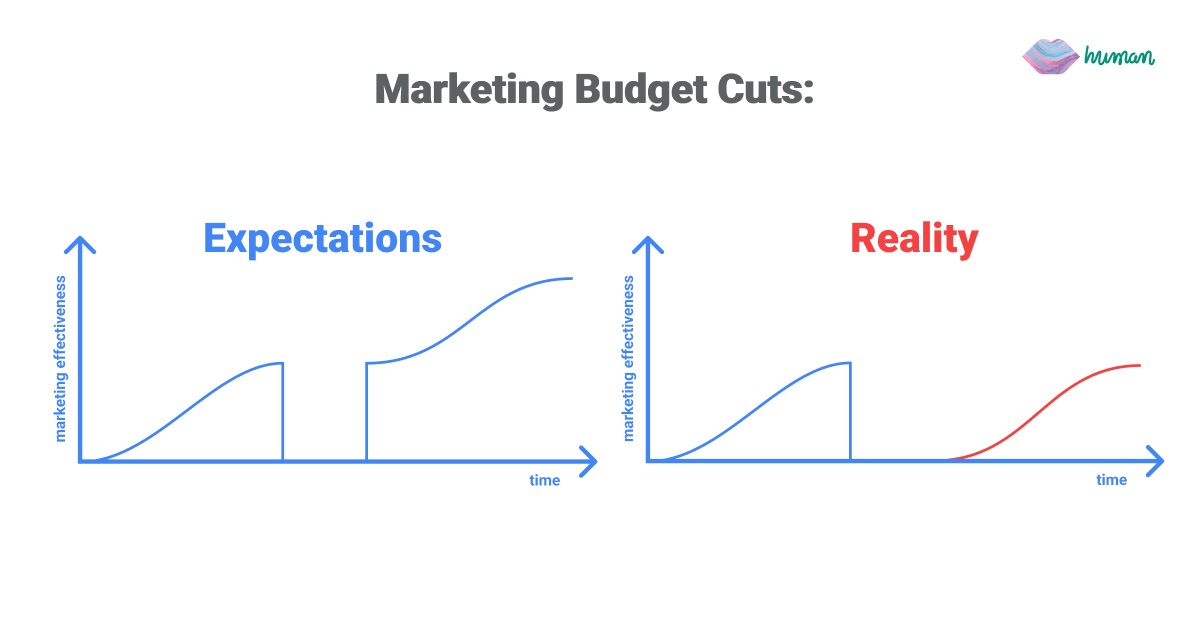One of Walmart’s jaw-dropping iron rules for the recession is “Get your cost down. But not marketing. It’s a mistake to cut costs here and a bigger mistake not to have the right mix in marketing, to reach customers.”
Why did Walmart realize that in the rush to cut costs, marketing is not the one to flop?
Economic crisis? Recession? These buzzwords are resounding in media with increasing frequency and force. Many companies are reacting with panic, looking for savings instinctively, in many cases making cuts in areas not directly related to developing a product or a service. The first to go are employee programs, HR and…. marketing.
Is this the right tactic? Does a product or service have a chance to survive without marketing? What exactly is modern marketing anyway? It is nice to have or a must have? Is a break in marketing really just a break, or does it mean something completely else?
Are we on the same page?
First, we should start by defining modern marketing, as many stereotypes have grown up around the term.
Marketing has long ceased to mean just hyped, loud and budget-busting ATL campaigns. An increasing number of marketing activities involves consistent, methodical brand positioning – such as developing close relationships with consumers or content marketing, in which the brand is the creator or co-creator of content.
If one were to use the analogy of human relationships, this could be called a friendship. How would you feel if your friend suddenly disappeared, stopped answering your calls or replying to messages? Poorly nurtured relationships wither away. The consumer-brand relationship is no different.
Surviving on a diet marketing
Whether you should cut marketing spending during a crisis depends on the specific circumstances and nature of the crisis you are facing. Here are some factors to consider:
- Industry: Some industries are more affected than others during a downturn. For example, travel and hospitality tend to be more affected. If you are in an industry that is struggling, you may need to cut costs in all areas and focus on optimizations, out-of-the-box tactics and perhaps even experimentation.
- Audience: If your target audience is directly affected by the crisis, they may be less likely to engage with your marketing messages. If this is the case, it’s worth making some adjustments to your message.
- Competition: If your competitors are cutting back on marketing spendings, this could be an opportunity for you to gain market share by maintaining or increasing your marketing efforts.
Long-distance runners do not enjoy breaks
In the pursuit of quick savings, a temptation to take a momentary break may arise – supposedly a quick break from marketing. However, long-distance runners do not enjoy breaks. They knock them out of rhythm, cause the blood and muscles to cool down, and affect the entire cardiovascular system and breathing rate.
They also cause a drop in endorphins, which can reveal pain. The same goes for the continuity of marketing activities. A break does not mean a pause. Break means a definitive stop and a return to the starting point.

It is not worth giving in to panic and lemming-like rush because the consequences can be irreversible. Take paid campaigns as an example. Every campaign is preceded by a set of preparation and setup activities – this costs money. Advertising algorithms need time to learn a new campaign, taking into account new external and internal factors,and current circumstances. This will all change from the moment you decide to take a break. While your competitors’ campaigns were responding seamlessly to changes in demographics, behaviour, etc., your brand was out of circulation, incurring debt.
Ok, this applies to paid campaigns. But I rely mainly on content and organic traffic. The above rules don’t apply here, right?
Well… In a way they do. The position of your website in SERP (search engine result page) is not given forever. One of the key factors affecting the position is the relevance of content and consistency in publishing new articles, posts, videos, etc. A position is built over a long period of time, with tremendous effort and consistency. But it can be lost quickly. As in the previous example, not moving forward really means moving backwards. Competition will not wait.
Search engine algorithms have no mercy in penalizing inconsistent publishers.
Can you afford to lose loyalty?
You also need to keep in mind the aspect of maintaining customer loyalty.
This is more profitable than acquiring new ones, as existing customers typically spend 31%* more than new ones. To ensure customer loyalty, it is important to optimize your online channels and provide reliable support and information. Consistent communication through personalized messages, product updates, and offers is also essential to keep customers engaged and encourage future purchases.
Marketing plays a crucial role in generating attention and engagement for your brand, and cutting back on marketing efforts can significantly impact customer loyalty. Without adequate promotion and sales activities, customers may lose interest and doubt your business’s ability to provide long-term support. Focusing on customer loyalty through marketing efforts can help you avoid wasting resources and ensure that you are targeting the right audience and.
Make smart decisions, do not rush
In today’s cutthroat business world, marketing is more important than ever. Yet, some companies may be tempted to tighten their belts and reduce marketing budgets during tough times. While this may seem like a sensible cost-saving measure, it’s a bit like cutting off your nose to spite your face. By reducing marketing spendings, businesses are sacrificing the very thing that could help them weather challenging times – brand awareness, customer engagement, and revenue growth.
Sure, it may feel good to save a few bucks in the short term, but in the long run, businesses that neglect their marketing efforts are shooting themselves in the foot. After all, if no one knows about your products or services, how can you expect to sell them? Investing in marketing initiatives can help companies stand out from the crowd, build brand loyalty, and ultimately drive revenue growth.
So, if you’re considering slashing your marketing budget, you might want to think again. As the saying goes, you have to spend money to make money. And in the case of marketing, it’s definitely worth the investment.
So take your time, and look for savings – not cuts, and definitely no shortcuts.





